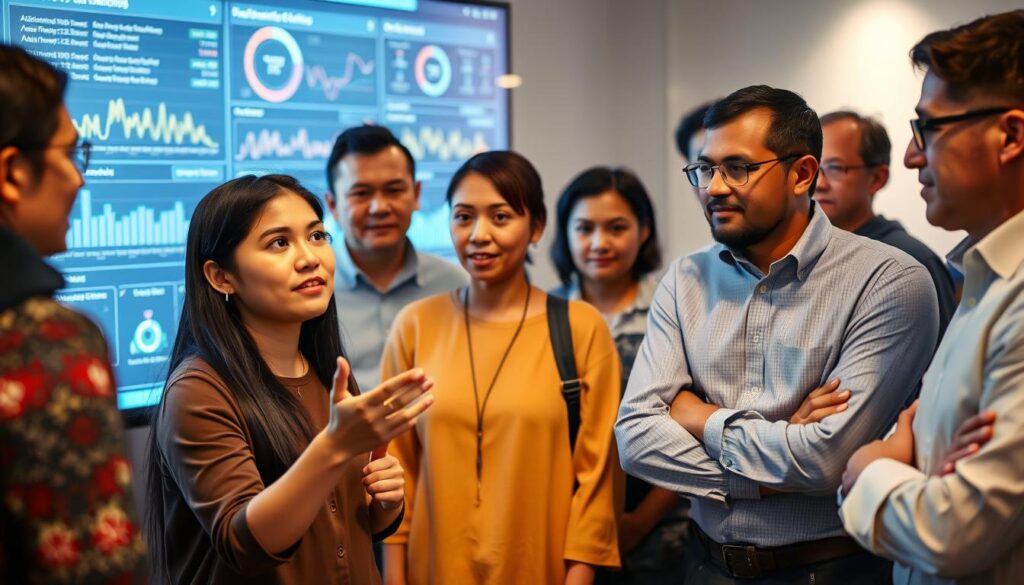Artificial intelligence is changing many industries, but a big question remains: Can we trust AI systems built on biased data? This question shows the big challenge we face in making AI fair. It also points out how urgent it is to make AI practices more inclusive.
The ethics of AI go beyond just technology. They affect fairness and equality in society. Studies have shown AI can even discriminate, like in healthcare and hiring. So, it’s up to developers and leaders to use AI that is fair and inclusive.
By focusing on AI fairness, we can create systems that everyone trusts and accepts. This is important in places like Southeast Asia too.
Key Takeaways
- AI fairness is essential for building trust and ensuring equitable outcomes in technology.
- Inclusive AI practices can mitigate biases that affect marginalized groups.
- Ethical AI is necessary for promoting transparency in algorithmic outputs.
- Unbiased AI algorithms are crucial for preventing discrimination in sectors like healthcare and hiring.
- Implementing diverse datasets can enhance the effectiveness of AI systems.
- Addressing AI fairness not only benefits society but also improves user acceptance.
Understanding AI Fairness: A Key to Innovation
AI fairness is now a key topic in tech, as companies face the dangers of biased algorithms. Making AI fair is not just right; it drives innovation and ensures AI is used responsibly. More and more, people are realizing the importance of avoiding AI bias.
Now, 75% of companies are worried about these issues. This shows the need for strong steps to fix biases in AI.
Defining AI Fairness and Its Importance
AI fairness means recognizing that not all algorithms are unbiased. There are big challenges from racial and gender biases. For example, hiring tools often favor groups that are underrepresented, but 60% of them show bias against these groups.
Yet, only 30% of AI experts think their companies handle fairness well. Setting clear ethical rules could help, as 50% of workers say lack of rules stops them from using AI responsibly.
The Role of Fairness in AI Development
Fairness is crucial in making AI systems. Teams with different backgrounds do better, with a 35% boost in performance. Including diverse voices helps spot biases that single groups might miss, making decisions better.
In fact, 70% of people think diverse views lead to better results. Regular checks on AI systems can cut bias by 40%. This shows the value of being open, something 80% of users want from AI.
The Need for Inclusive AI Practices in Southeast Asia
Southeast Asia is a vibrant mix of cultures and languages. It has over 100 ethnic groups and more than 1,000 languages. As technology grows, it’s crucial to make AI work for everyone in this diverse area.
With 460 million internet users, and 100 million new ones in three years, AI must reflect this diversity. This ensures that AI solutions meet the needs of all people.
Current Demographics and Diversity in the Region
This area is known for its tech-savvy population and unique cultures. The rise of mobile-first users shows the need for AI that fits local tastes. A Mozilla report found that most data comes from just 12 top institutions.
This lack of diverse data makes inclusive AI practices even more important. They must reflect the distinct needs of Southeast Asia.
Challenges Faced by Businesses in Implementing Inclusivity
Businesses in the region face big challenges in making AI inclusive. They struggle to understand and avoid AI biases. This can lead to systems that don’t work for everyone.
Getting diverse data is hard, making it tough to truly capture the region’s diversity. Cultural and digital literacy barriers also complicate the use of inclusive AI.

Case Studies: Successful Asian Companies Embracing AI Fairness
Asian companies are leading the way in using AI for good. They show how AI can help make technology fairer. These stories highlight how businesses can make products that everyone can use, meeting different needs.
Grab: Enhancing Transportation Access with AI
Grab has changed how people move around in Southeast Asia with AI. They use smart tech to find the best routes and make sure everyone can get a ride. This makes travel cheaper and better for everyone.
Grab focuses on helping those who need it most. They show how tech can make cities better and bring people together. Their work not only improves travel but also builds trust in the community.
Unilever’s Data-Driven Inclusivity in Product Development
Unilever uses data to make sure their products fit what people in Asia want. They look at trends and what customers like to make products that appeal to many. This makes customers happy and loyal to the brand.
Unilever always listens to different voices to improve their products. This approach shows their dedication to fairness and making things better for everyone.
Building an Inclusive AI Framework
Creating an inclusive AI framework is key to fairness and reducing biases in AI. It focuses on being open, accountable, and diverse in design. The main goal is to make algorithms that meet the needs of all people. By working with many stakeholders, we can spot biases that are missed in regular AI development.
Essential Principles for Fairness in AI
For inclusive AI, we need to follow important principles. These include:
- Transparency: Being clear about how AI makes decisions builds trust.
- Accountability: Making sure companies are responsible for AI’s effects stops harm.
- Data Diversity: Using different data sets is crucial. Algorithms trained on the same data can fail for certain groups.
- Regular Audits: Checking algorithms often helps improve fairness. Companies that do this see better fairness results.
Engaging Diverse Stakeholders in AI Design
Getting diverse groups involved in AI design is essential. People from different backgrounds help spot needs and avoid biases. Including community voices makes AI more valuable and accepted.

The Role of Government in Promoting AI Fairness
The government is key in making sure AI is fair and responsible. In the Philippines, policy initiatives are in place to promote ethical AI. These efforts aim to create a transparent and inclusive environment.
National strategies are set to regulate AI innovation. They protect citizens’ rights and interests.
Policy Initiatives in the Philippines
The Philippine government has started several policies for AI. These policies aim to improve AI ethics by setting guidelines for fairness and accountability. Some key actions include:
- Creating a national AI strategy to promote responsible AI use in different sectors.
- Training government agencies on AI governance and ethics.
- Supporting local businesses to use AI responsibly, considering diverse populations.
Regional Collaborations for AI Governance
Working together is crucial for AI governance in Southeast Asia. Countries share best practices and resources to tackle AI challenges. Important parts of these partnerships are:
- Setting unified guidelines for ethical AI practices across borders.
- Starting joint research on AI’s social impact.
- Exchanging knowledge and skills to reduce AI bias and inequity.
As AI grows, the government’s role in these policy initiatives is vital. It will help create a fairer digital world for everyone, supporting innovation and ethics.
Practical Strategies for Leaders to Ensure Inclusivity
Leaders are key in making sure everyone feels included in their teams. To tackle AI challenges, it’s important to use practical strategies. Training teams and using AI bias tools can help make systems fairer.
Training and Workshops for Teams
Training programs are crucial for spotting biases in team members. Sessions on diversity, equity, and inclusion teach the value of inclusivity in AI. Studies show teams with strong AI ethics committees follow diversity rules better.
Anti-bias training can also keep diverse teams together longer. Here are some tips for training:
- Host workshops to talk about AI biases and their effects.
- Work with diversity experts to add D&I to AI plans.
- Test AI with different groups to find and fix issues.
Implementing Bias Detection Tools
Using AI bias tools is a smart way to find and fix discrimination. These tools check AI for fairness before and after it’s used. They also help make datasets more diverse. This leads to better AI and more accountability.
- Do deep audits of AI to cut bias by 30%.
- Get diverse teams to review algorithms for better bias spotting.
- Keep datasets up to date to boost AI accuracy by 15%.

Creating an inclusive culture takes hard work and dedication. Leaders who focus on training and AI bias tools help make AI fairer. This builds trust and satisfaction among users.
Technology for Social Impact: AI Solutions for Community Development
AI technologies can greatly help in community development. They improve healthcare and help small businesses grow. This leads to more fairness and wealth in areas that need it most.
AI in Healthcare: Improving Access and Equity
Many communities struggle to get good healthcare. AI can help by making health services more available. For example, AI-powered telemedicine lets people get medical help from home.
AI also helps health centers work better by analyzing data. This means they can focus on the most needy. Regular checks help make sure AI keeps meeting community needs.
Empowering Small Businesses with AI Insights
Small businesses often find it hard to keep up without the right data. AI gives them the tools to compete better. It helps them understand what customers want and how to serve them better.
This boosts their chances of success and helps the local economy grow. When local people help decide how AI is used, it becomes even more effective. It meets the specific needs of the community.
Monitoring and Evaluating AI Fairness
It’s crucial to monitor AI fairness to make sure it’s inclusive. Companies need to use strong evaluation metrics to check if their AI is fair. These metrics help spot any unfair treatment in different groups.
Metrics for Assessing Inclusivity in AI Solutions
Evaluation metrics are key to reducing biases in AI. For example, fairness metrics can show if certain groups are treated unfairly in hiring or lending. Important metrics include:
| Metric Type | Description |
|---|---|
| Statistical Parity | Evaluates if different groups have equal probabilities of receiving positive outcomes. |
| Equal Opportunity | Ensures qualified individuals from diverse backgrounds share the same likelihood of receiving positive outcomes. |
| Equality of Odds | Requires similar true positive and false positive rates across various groups. |
| Predictive Parity | Checks that predictions maintain the same precision across different demographic groups. |
| Treatment Equality | Focuses on balancing the false positive and false negative rates to ensure fair treatment. |
Continuous Improvement through Feedback Loops
AI systems should always be improving to avoid biases. Feedback loops help companies tweak their algorithms based on user feedback. Regular checks on fairness metrics let them make quick fixes and keep AI fair.
Using strategies like data augmentation and fairness constraints can make AI work better for everyone. This ensures AI is fair and helpful for all.

Encouraging Ethical AI Partnerships
Creating ethical AI partnerships is key to making AI systems that everyone can use. Working with NGOs and community groups lets companies talk openly. This ensures technology meets the needs of all people.
This partnership way helps make AI better for education, helping people with disabilities, and for those from different backgrounds. It makes AI more inclusive.
Collaborating with NGOs and Community Organizations
More companies are seeing the benefits of working with NGOs for ethical AI. The Lenovo Foundation’s AI for Social Impact webinar on June 13, 2024, showed how important diversity in AI is. Experts talked about using diverse data in AI, saying it’s crucial to address different kinds of diversity and disabilities.
This teamwork makes AI systems more effective and fair for everyone.
Building Trust through Transparency in Algorithms
Trust in AI comes from being open about how algorithms work. Using explainable AI makes AI’s decisions clear. This makes users feel more confident in AI’s use of data.
Regular checks on AI systems keep them ethical. This builds trust with customers, employees, and others. Companies that focus on being transparent will stand out.
Learn more about these practices in this guide for responsible leaders.
Future Trends in AI Fairness and Inclusivity
The world of artificial intelligence is changing fast, focusing more on fairness and inclusivity. Companies are working hard to make AI unbiased and accurate. They use diverse datasets to train AI models, making them fairer for everyone.
This focus is key to reaching social equity and justice goals. It’s all about making AI work for everyone, not just a few.
The Growing Demand for Diverse Datasets
There’s a big push for diverse datasets in AI now. Industries see how important it is for fair AI systems. Studies show AI is getting better at diversity and inclusion, but there’s still a lot to do.
There are over 55 challenges in AI for diversity and inclusion. Solutions are coming, but we need to include more identities and backgrounds. It’s not just about gender anymore.
Leveraging AI for Sustainable Development Goals
AI can help a lot with global problems. It’s getting more attention in areas like healthcare, where diversity is key. But, there are still big challenges and not enough solutions.
The Veritas initiative wants AI to be fair and transparent. This is crucial for using AI responsibly.
| Aspect | Current State | Future Trends |
|---|---|---|
| Diverse Datasets | Increased recognition in training AI models. | Wider adoption in various sectors. |
| Investment in AI | ₱2.66 trillion in the US for 2022. | Continued growth with a focus on fair AI practices. |
| Research on D&I | Limited literature on AI applications for D&I. | Emergence of extensive studies highlighting diverse applications. |
| Principles of Trustworthy AI | Human-centricity, fairness, explainability. | Adoption of comprehensive frameworks in AI development. |
The future of AI looks bright, with a focus on fairness and inclusivity. Companies should use diverse datasets and align AI with sustainable goals. This will lead to big improvements for society.
Conclusion: A Collective Responsibility Towards Fair AI
In the world of artificial intelligence, finding fair AI practices is key. Business leaders play a big role in making this happen. They shape how AI works, affecting many people’s lives.
By focusing on inclusivity and ethics, companies can do more than just make money. They can help communities grow. This means being open and accountable, which is very important.
The Role of Business Leaders in Shaping AI Practices
Business leaders are key in making AI fair. They can set up rules for using AI in a good way. This helps society a lot.
They should start by checking their AI systems and seeing how they affect people. By working with different groups and training teams, they can make AI fairer. This shows they care about being open.
Call to Action: Champion Inclusivity in Your Organization
We’re moving towards a future where AI is everywhere. It’s time for companies to make sure AI is fair for everyone. Leaders should make sure AI is used in a way that helps everyone.
By listening to all voices and using AI to solve big problems, companies can make a difference. Let’s work together to make technology fair for everyone.

